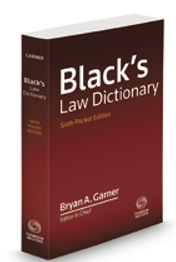Pocket of Magic: The Secret of the New Little Black’s Law Dictionary

The 6th Pocket Edition of Black’s Law Dictionary (Black’s Pocket) has just arrived. It’s a beautiful little book. Well, it’s bigger than most pockets will accommodate: you’ll need a capacious pocket, but inside you’ll find magic.
The book was written for law students who need quick, reliable definitions. Shortly after I was asked to do the first edition — something that had never been attempted — I was a guest lecturer at a law school. The year was 1994. Before being introduced, I saw the tail end of a lecture on criminal law. A young man on the back row was being asked what Jencks material is. Flustered, he couldn’t answer.  So I invented him as my intended reader. It was a myth that would influence my entire approach to the book. Whatever the term might be, this nervous law student was being grilled on the precise definition of the term. In my scenario, which I used right through the completion of this dictionary, I imagined this law student with Black’s Pocket hidden on his lap, just below the desk, where he could glance at it.
So I invented him as my intended reader. It was a myth that would influence my entire approach to the book. Whatever the term might be, this nervous law student was being grilled on the precise definition of the term. In my scenario, which I used right through the completion of this dictionary, I imagined this law student with Black’s Pocket hidden on his lap, just below the desk, where he could glance at it.
“Mr. Jones, what is Jencks material? You’ve read the case. What is it?”
Glancing at the book, our beleaguered student is able to say, “Professor, it’s a prosecution witness’s written or recorded pretrial statement that a criminal defendant, upon filing a motion after the witness has testified, is entitled to have in preparing to cross-examine the witness.”
The professor continues: “Why is it called Jencks material?”
“It’s named after a 1957 case cited in the opinion we read last night. The Supreme Court precedent was Jencks v. U.S. And later Congress passed the Jencks Act.”
“Mr. Jones, why does the defense even need Jencks material?”
“Defense counsel typically use it for impeachment purposes. The statement may contradict an earlier statement by the same witness.”
“Good, Mr. Jones.”
The student heaves a sigh of relief. He didn’t know any of that until he glanced at the ten and a half lines in Black’s Pocket.
Every definition in Black’s Pocket is like that. In just a few lines, you’re immediately told the essence of what every important term in law means. Today you’re more likely to need it on a Zoom call — something I hadn’t envisioned in 1994. But it can be a lifesaver. You needn’t even change your computer screen because that little pocket of magic is right in front of you.
Believe it or not, the 6th edition of Black’s Pocket is the 15th version of Black’s Law Dictionary I’ve researched and written: five big unabridged editions (the latest being more than 2,100 pages); four midsize abridgments; and now six versions of Black’s Pocket — each better and more thorough than the last. It’s hard, exacting work.
I don’t do it alone. I have a team of erudite lawyers, law professors, and even judges who help me. But whatever their suggestions are, no matter how erudite, I never forget that frazzled law student who’s being put on the spot.
That could be you. You need the answer fast, without seeming to be consulting a book. You have only seconds to redeem yourself. You must think fast, and you need to be good with the alphabet. If you can do those things, Black’s Pocket will make you look smarter than you actually are. And if you’re really smart as it is, you’ll look like a genius.
Professor Ross Davies has called this new Black’s Pocket “not only the authoritative reference tool for law words but also a pleasingly readable, easy-to-understand work of literature in its own right.”
If that’s true, it’s traceable to the approach — to you. It was written for you.
This guest post was written by Bryan A. Garner, who has been editor in chief of Black’s Law Dictionary for the past 25 years. He is the author of many books on law and language, including Making Your Case and Reading Law, both written with the late Justice Antonin Scalia. He is also a distinguished research professor of law at Southern Methodist University and president of LawProse Inc.